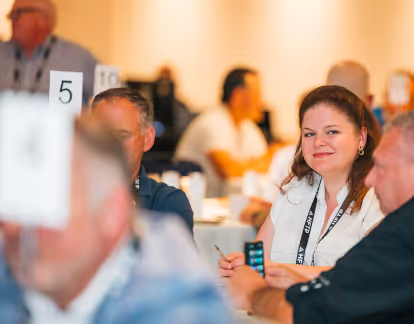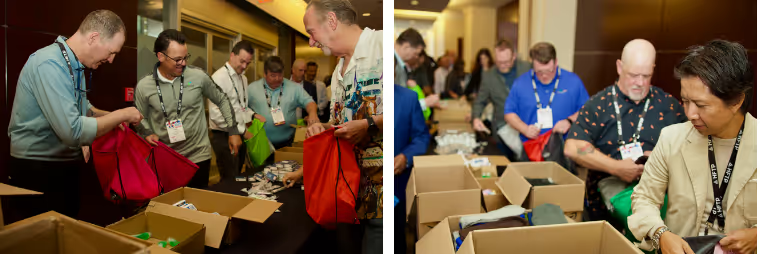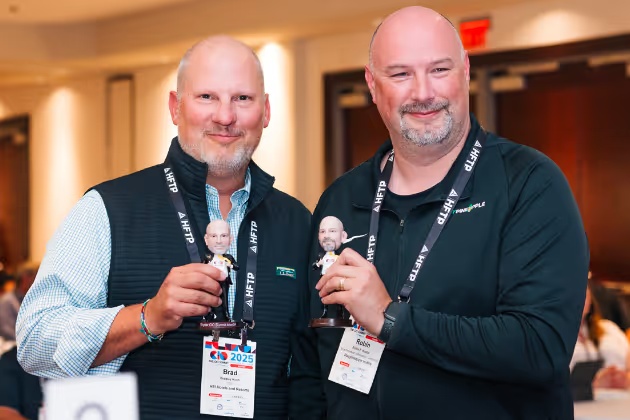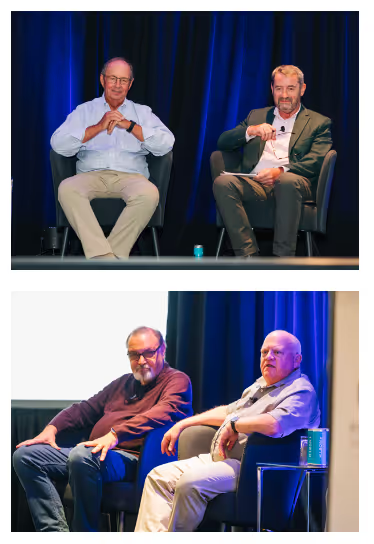THE STATE OF THE INDUSTRY

Nicole Nguyen, senior vice president at CBRE Hotels, kicked off the program by outlining an economic landscape defined by tariffs, travel shifts and significant uncertainty as of the first week of September. Both the Canadian and U.S. economies are facing headwinds, with GDP forecasts being revised downward due to trade tensions and persistent inflation. The Canadian economy is particularly threatened by trade disputes, which have pushed the Economic Policy Uncertainty Index to record highs and prompted major companies like GM and Honda to cut jobs and postpone investments. With inflation remaining elevated in both countries, it is unlikely that either the Bank of Canada or the U.S. Federal Reserve will move to cut interest rates much in 2025. Note: The U.S. Federal Reserve lowered the interest rate after this presentation.
These economic conditions are directly impacting travel behavior. A decline in real disposable income growth is eroding, a key driver for leisure travel. Inbound international travel to both the U.S. and Canada is down, with total overseas inbound travel to the U.S. hovering at 80% of 2019 levels as of June 2025. While Canadian air passenger volume is above 2019 levels, its growth has flattened. Corporate travel also remains subdued, evidenced by office attendance rates lingering just above 50%.
For the hotel industry, this has resulted in diverging performance. Canadian RevPAR remains stable, while U.S. RevPAR slowed and turned negative in June 2025. In June, only 35% of U.S. markets reported RevPAR growth. The forecast for the full year 2025 anticipates approximately 2.5% RevPAR growth in Canada, while U.S. RevPAR is expected to be flat. With top-line growth slowing, hotel operating margins are facing significant pressure from increased costs. The outlook for the coming years is for modest but positive growth, demand- ing that operators focus on controlling expenses and making prudent capital investments.
KEY TAKEAWAYS
Challenging Economic Conditions. This has led to record-high uncertainty, and downward revisions of GDP forecasts for 2025 and 2026.
Weakening Inbound and Corporate Travel. While U.S. outbound international travel remains strong, inbound tourism to both countries is down.
Slowing Hotel Performance and Margin Pressure. For the full year 2025, U.S. RevPAR is forecast to be flat, while Canadian RevPAR is expected to grow by roughly 2.5%. With slowing revenue, hotel operating margins are under significant pressure.
Cautious Outlook Requiring Focused Management. The forecast over the next couple of years is for modest but positive growth. However, high uncertainty continues to impact business and consumer confidence. This environment requires hotel operators to focus on keeping expenses in line and making prudent capital investments to navigate the challenging conditions.

THE TRANSFORMATIVE IMPACT OF AI
The next panel featured Tim Kinsella of Canary Technologies, Michael Lederman of The Leading Hotels of the World, and Nick Price of NetSys Technology Holdings Ltd. They discussed the transformative impact of AI on the hospitality industry.
Tim opened by sharing findings from a technology survey of more than 325 hoteliers. The survey revealed that IT budgets are rising, with 93% of respondents expecting IT spending to increase in the coming years. A significant portion of this new investment is earmarked for AI, with 77% planning to allocate between 5% and 50% of their IT budgets to AI tools. The primary business objectives driving this investment are increasing efficiency (62%), improving the guest experience (58%) and increasing revenue (50%). However, Kinsella noted that the industry's fragmented technology landscape, where data is siloed across many different systems, poses a significant challenge to leveraging AI effectively.
The panelists agreed that while users often overestimate the near-term impact of new technology, they "grossly underestimate" the long-term effects of technologies like AI. Michael Lederman noted that AI is progressing through the typical technology hype cycle but at a much faster pace than previous innovations. The immediate value is already being seen in operational efficiency. AI can handle 70-90% of routine guest inquiries, freeing staff to focus on more complex and higher-value interactions that enhance the guest relationship.
A major theme of the discussion was the belief that AI will fundamentally disrupt travel booking in a way not seen since the advent of OTAs. Panelists predict that AI-powered search agents will rapidly become the primary way guests plan and book travel, potentially disintermediating hotels that are not prepared. While this presents a threat, Nick Price argued it is also a “one shot” opportunity for the industry to “turn the tables” and facilitate direct engagement with customers.
To realize this future, the panel identified critical challenges that must be addressed, including data quality, interoperability between systems and digital identity management. The consensus was that the time for the industry to act is now. Lederman warned that a failure to strategically manage AI adoption would amplify the “shadow IT” problem, leading to a loss of data control. The panel urged attendees to begin experimenting, establish internal labs to learn and test, and develop a long-term strategic plan for integrating AI into their operations and guest experience.
CYBERTHREATS AND THE INDUSTRY
In his session on thwarting nation-state cyberthreats, Bob Flores of Applicology detailed the sophisticated nature of government-sponsored cyber operations and provided a framework for defense. He identified key actors such as Russia, China, Iran and North Korea, whose goals range from espionage and intellectual property theft to the disruption of critical infrastructure. These groups are well-funded and use advanced, long-term persistence strategies, often remaining undetected in a network for years before launching an attack. Flores cited major incidents like the SolarWinds and Colonial Pipeline attacks as stark examples of their impact.
To counter these threats, Flores advocated for a comprehensive, multi-layered defense strategy. He stressed the importance of adopting a recognized security framework, such as NIST or ISO 27001, to ensure all defensive measures are covered. A cornerstone of this strategy is implementing a “zero trust” culture, which operates on the principle of “never trust, always verify” and assumes the network is already compromised.
Key technical controls include rigorous identity and access manage- ment, with multi-factor authentication (MFA) being an important defense. Flores also recommended stringent application controls, robust vendor due diligence to secure the supply chain and a strict policy of no remote administration for critical systems. The goal isn’t perfect security, but to make your organization a hardened target, increasing the cost and difficulty for attackers so they seek easier targets elsewhere.

A CIO'S LEGAL COMPASS
In his session, Greg Duff of Foster Garvey provided a legal update on critical issues facing hospitality technology leaders, including junk fees, guest surveillance and the rapidly evolving landscape of artificial intelligence (AI).
Operational and Contracting Updates
Duff addressed the complex issue of “junk fees,” clarifying that current regulations focus on transparent disclosure rather than outright prohibition. With the Federal Trade Commission (FTC) rule not preempting state laws, hoteliers now face a complex web of regulations across 16 states, each with unique requirements. He also covered guest surveillance, noting that while video is generally permissible in public areas with proper signage, audio recording is highly restricted by wiretapping laws. Duff strongly advised against releasing video footage without a warrant to avoid privacy lawsuits.
On the contracting front, Duff highlighted the importance of carefully allocating liability. He referenced a recent California court case (New England Country Foods v. Vanlaw Food Products) that suggests tort claims, such as a breach of fiduciary duty, might circumvent contractual limits on liability, a significant concern for operators in agency relationships. CIOs should scrutinize indemnity clauses and liability caps in vendor contracts.

The Legal Maze of Artificial Intelligence
Greg heavily focused on the legal risks associated with AI. While AI is being deployed across all areas of hospitality – from revenue management to HR – it introduces significant legal challenges. Key risks include intellectual property infringement, data privacy and security concerns, and the potential for algorithmic bias, especially in consequential decisions like hiring.
Duff pointed to the recent Air Canada case as a crucial lesson in accountability. A court held the airline responsible for incorrect information provided by its customer service chatbot, rejecting the company's claim that the bot was a separate legal entity.
The emerging regulatory framework, including the federal “America's AI Action Plan,” is based on principles like transparency, accountability and risk-based classifications. Duff urged CIOs to act now by conducting an AI audit to inventory its use, establishing internal policies, educating their teams and thoroughly vetting vendors on their use of the technology.
AI AGENTS AND APIs
Combining the ultimate one-two punch, Michael Goldrich of Vivander Advisors argued in the next session that for AI to deliver on its promise, hospitality leaders must do more than just adopt new tools; they must fundamentally redesign their workflows. Drawing a parallel to the early 20th century, he noted that simply replacing factory steam engines with electric motors yielded minimal gains. True productivity leaps only occurred when Henry Ford reengineered the entire factory process with the assembly line. Goldrich contended that to avoid the 95% failure rate of current AI projects, today’s CIOs must own this redesign, evolving into the “Chief Intelligence Orchestrator.”
This transformation is being enabled by several key advancements. More powerful models like GPT-5 offer higher reasoning and reduced hallucinations, while “Connectors” allow AI to access and act on information in emails, calendars and drives. A critical development is the Model Context Protocol (MCP), a universal standard designed to simplify how AI agents connect to disparate data systems like the PMS and CRM, replacing the need for countless individual API integrations. Goldrich also highlighted the “Invisible Discovery Crisis,” where AI-powered search engines are providing direct answers, leading to a rise in “zero-click searches” – nearly 60%. This means hotels risk losing visibility if their content isn’t optimized for AI consumption through new strategies like Answer Engine Optimization + (AEO) and Generative Engine Optimization (GEO).
Successfully implementing this new model requires a disciplined approach. It begins with establishing AI Literacy across the organization to build confidence and ensure proper use. Strong governance, including an AI Council and “human-in-the-loop” (HITL) workflows, is essential to manage risk. The future will see the rise of the “agent boss” – a human manager supervising hybrid teams of people and digital agents and even agent-to-agent booking systems.

CONSULTANTS CORNER
In a panel discussion moderated by Julian Bish, panelists John Burns, Mark Haley and Scot Campbell explored how hotels can achieve a competitive edge in a “sea of sameness,” where technology platforms are largely similar. The panelists agreed that true differentiation comes not from the technology itself, but from its implementation and the people using it.
John Burns argued that success lies in deep system use, noting that most hotels only use 20% to 35% of a system's functionality. He and Mark Haley stressed the need for organizations to create internal champions who master AI technology and drive its adoption. Scot Campbell offered a counterpoint, suggesting that differentiation can often be achieved through humancentric service rather than by bolting new technology onto existing platforms.
The conversation then shifted to avoiding project failures, or dumpster fires. Campbell identified a common pitfall: executive and operational leaders often disengage after a contract is signed, leading to a breakdown in communication. The consensus solution involves maintaining a regular and frequent communication cadence, such as daily stand-up meetings, and ensuring a dedicated project owner and executive sponsor from the hotel remain involved throughout the process. Panelists also emphasized that the onus is on the client to escalate issues with vendors promptly to ensure accountability.
Finally, the panel addressed the mythical labor-saving unicorn, agreeing that direct labor savings are often difficult to quantify. They suggested that the real value of new technology is often found in improved operational efficiency, higher employee morale and better staff retention by automating mundane tasks. Mark Haley pointed out that effective integrations are key to eliminating the redundant manual entry that frustrates employees. While asset managers demand hard numbers, the panel concluded that the goal of technology should be retaining valuable staff by improving their work experience.
COMPETITION IS KEY
Justin Michael Taillon, president of HFTP, provided an update on new changes to HFTP certifications, including but not limited to the CHTP and CHAE. Attendees also participated in a fun –though frustrating on a small screen virtual escape room game.
The Certified Hospitality Accountant Executive (CHAE) is the leading credential for finance and accounting professionals, validating expertise in financial management, internal controls and ethics. The Certified Hospitality Technology Professional (CHTP) is the gold standard for IT leaders, proving mastery over the entire hospitality tech ecosystem, from property management systems to cybersecurity.
Earning these certifications provides significant career benefits, including enhanced professional credibility, increased earning potential, and a competitive advantage for senior leadership roles. The process requires meeting eligibility standards based on experience and education, passing a rigorous exam and maintaining the credential through continuing education. This ensures certified professionals remain at the forefront of the industry.
THE ANNUAL CIO ROUNDTABLE
During a wide-ranging CIO roundtable, hospitality technology leaders discussed the industry's most pressing challenges, from guest experience and system modernization to the escalating cybersecurity threat.
A key theme was the effort to reduce guest friction through mobile-first and contactless solutions. While digital keys are gaining traction, the industry is still debating the value of native apps versus more accessible web-based solutions, and kiosk adoption remains slow. The discussion also covered the monumental task of PMS modernization, with many hotels still running end-of-life OPERA V5 systems. The consensus was that a move to the cloud presents a critical opportunity to re-evaluate the entire technology ecosystem and improve underlying business processes, rather than simply replacing one component.
Cybersecurity dominated much of the conversation. Leaders are moving away from SMS for multi-factor authentication and are deploying more secure methods like hardware UbiKeys. Policies are also becoming stricter, with many moving to a “no BYOD” (bring your own device) environment and using managed browsers to lock down access. The constant threat of vendor and supply chain breaches has created a need for perpetual vigilance. As one participant noted, in cybersecurity, “You don't have to run faster than the bear, just faster than anyone else.” The group also acknowledged the emerging threat of AI being used by malicious actors to easily create malware.
The CIO Summit addressed the hospitality industry's dual challenges of navigating a cautious economic climate marked by slowing travel and margin pressure, while also grappling with the transformative wave of artificial intelligence. Speakers focused on leveraging AI as a catalyst for redesigning core business processes, while simultaneously building robust cybersecurity defenses and navigating complex legal risks around data and liability.
Ultimately, the summit concluded that success in this new era depends less on the technology itself and more on strategic leadership, system implementation and a focus on empowering people through technology.
Thank you to our 2025 CIO Summit speakers and sponsors who helped make this year's event such a success.
Premier Sponsor: Canary Technologies
Signature: Agilysys, Blueprint RF, Enseo, Nomadix, POST Hospitality Payments and Sertifi by Flywire Transportation Sponsors: Cloud 5, IBS Software and World Vue















